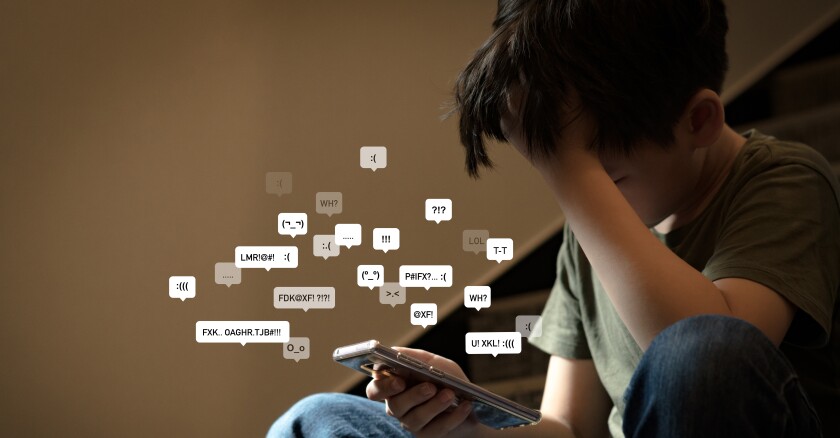Science
NYC Students Report 42% Experience Regular Cyber Bullying

A recent citywide survey has revealed that approximately 42 percent of students in New York City public schools experience regular cyber bullying. This increase follows the pandemic-related closure of schools, highlighting significant concerns about online harassment among students. The findings indicate that only 25 percent of respondents reported no instances of cyber bullying at their schools.
Mark Rampersant, the city’s top education official for school safety, expressed his concerns regarding the impact of cellphone use on young people’s mental health, stating, “I’ve seen young people becoming distracted. I’ve seen cellphones used as a tool for cyber bullying, and most of all, the thing that troubles me the most is watching young people’s mental health be affected by the overall use of cellphones.”
The survey results come as NYC’s school system prepares to implement new regulations aimed at addressing the escalating threats associated with cellphone use among students. Notably, the survey found that girls report experiencing cyber bullying more frequently than boys and that middle school students are more likely to be affected compared to their high school peers.
Trends in Cyber Bullying Reports
The survey shows a slight improvement from the 2023-2024 school year, when 43 percent of students reported being bullied online. In response to these alarming statistics, many schools, at the urging of former schools chancellor David Banks, began enforcing stricter policies. By the end of the previous school year, approximately 800 principals, or half of the school system, had imposed some limitations on cellphone use.
The newly passed state law, championed by Governor Kathy Hochul, aims to further curb cyber bullying by prohibiting students from using their phones during lunch and other free periods, in addition to class time. This comprehensive approach intends to better address the circumstances under which bullying often occurs.
The 2025 NYC School Survey, conducted from February 10 to April 11, included over 355,000 students, 440,000 families, and 62,000 teachers. The data collected is crucial for principals in improving their programs and for the city in measuring overall school quality.
Despite the troubling rise in cyber bullying, a growing majority of students, 68 percent, expressed agreement with the statement that they feel safe in their schools, marking an increase of 9 percentage points since 2019. Additionally, more than 80 percent of students reported feeling secure in hallways, bathrooms, locker rooms, and cafeterias.
Feedback from Families and Future Steps
When it comes to parental engagement, an impressive 96 percent of public school families expressed satisfaction with the education their children received in the last year. However, families indicated that they would like to see improvements in areas such as afterschool programs, sports teams, smaller class sizes, and more hands-on learning opportunities.
In a statement released on Tuesday, NYC Public Schools emphasized the importance of community feedback in shaping the future of the city’s schools. The new cellphone restrictions will take effect on the first day of school, September 4, as part of a broader initiative to combat cyber bullying and promote a safer educational environment.
-

 Entertainment2 months ago
Entertainment2 months agoIconic 90s TV Show House Hits Market for £1.1 Million
-

 Lifestyle4 months ago
Lifestyle4 months agoMilk Bank Urges Mothers to Donate for Premature Babies’ Health
-

 Sports3 months ago
Sports3 months agoAlessia Russo Signs Long-Term Deal with Arsenal Ahead of WSL Season
-

 Lifestyle4 months ago
Lifestyle4 months agoShoppers Flock to Discounted Neck Pillow on Amazon for Travel Comfort
-

 Politics4 months ago
Politics4 months agoMuseums Body Critiques EHRC Proposals on Gender Facilities
-

 Business4 months ago
Business4 months agoTrump Visits Europe: Business, Politics, or Leisure?
-

 Lifestyle4 months ago
Lifestyle4 months agoJapanese Teen Sorato Shimizu Breaks U18 100m Record in 10 Seconds
-

 Politics4 months ago
Politics4 months agoCouple Shares Inspiring Love Story Defying Height Stereotypes
-

 World4 months ago
World4 months agoAnglian Water Raises Concerns Over Proposed AI Data Centre
-

 Sports4 months ago
Sports4 months agoBournemouth Dominates Everton with 3-0 Victory in Premier League Summer Series
-

 World4 months ago
World4 months agoWreckage of Missing Russian Passenger Plane Discovered in Flames
-

 Lifestyle4 months ago
Lifestyle4 months agoShoppers Rave About Roman’s £42 Midi Dress, Calling It ‘Elegant’









